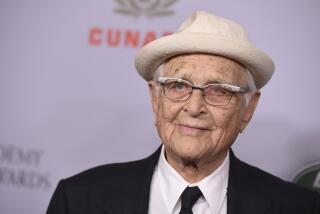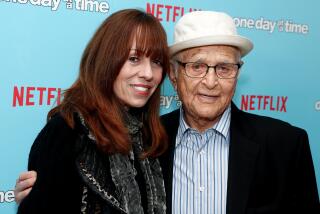MEMORIES OF ARCHIE LEACH
- Share via
A few days before Thanksgiving, Cary Grant invited me to join him for the races at Hollywood Park. Driving there, he was in fine form, laughing a lot and telling outrageous jokes--long, convoluted stories, the kind he liked best. One of them had as its tag a man telling St. Peter, “I left my harp in Sam Frank’s disco.” He loved that one.
At home in Beverly Hills he had books full of jokes, stories and quotes, for he would cut out and keep anything he read that caught his eye. These books, together with his other memorabilia, were kept indexed and filed in a special fireproof room in his home.
“They’d be fun to publish,” I once said, ill-advisedly.
He looked at me hard. “Nothing of mine is ever going to be published,” he said. And nothing ever was.
Cary never minded giving interviews--he rather enjoyed them, as a matter of fact, and could be extraordinarily frank--but he adamantly refused to write his own story.
I know, because I put the idea to him once or twice. As his friend of many years I had been approached by several publishers. But if the dollar signs dangling in the air attracted me, they appealed to him not at all.
“I’m much too busy living my life to write about it,” he said. “Anyway, only half of my life belongs to me; the other half belongs to those I shared it with.” He was genuinely distressed when Sophia Loren chose to write about their romance in her autobiography.
But if he disdained writing about his life, he was happy to answer questions about his career. And so his lecture tours were great successes. Right from the start he determined he would have nothing rehearsed--he’d just amble on stage with that familiar gait, sit on a stool and let people fire away. And fire away they did.
He determined to retire from movies when his daughter Jennifer (by his marriage to actress Dyan Cannon) was a baby because, having waited so long to start a family, he wanted to spend as much time as possible with her. He could afford to because, through shrewd business negotiations, he was a wealthy man, owning many of the negatives of his films. Also he found himself enjoying his life as a businessman on the board of Faberge, the cosmetics group.
Many producers tried to lure him back over the years but he would have none of it. “I’m tired of tripping over cables on movie sets,” he told me. And, having turned his back on movies, he never regretted it.
For a time he lived a rather reclusive life up in his “shack,” as he called it, on Beverly Grove Drive. It was a tumbledown place indeed, and often when I went up there I would find him having his dinner on the edge of his bed. “It’s the only comfortable room in the house,” he would explain.
Although he had lived in America for many years, he never lost his love for Britain and returned there often, driving through the countryside and stopping at pubs for sausages and mash which he would eat watched with quiet disbelief by the other customers. Often he would visit Bristol, his home town, where he still had a cousin, Maggie, and it was always a surprise to hear her address him by his real first name--Archie.
“You don’t even look like an Archie,” I told him.
“To her I do,” he said with a chuckle.
Then, on a visit to London for a Faberge meeting in 1981, he walked into a hotel lobby one day and saw her--Barbara Harris, the hotel’s public relations officer. He was then in his 70s; she was in her 30s. But so what? A fairly protracted courtship ended happily in marriage. And with that union his life began to open up. He became social again, delighting in showing off his young wife. They traveled extensively, to Europe and the Far East. And the “shack,” which he had been trying to remodel for years, finally got finished and became an all-white Moroccan-style home. Next to the steps leading to one entrance he had an incline built.
“That’s for when I’m in my wheelchair,” he said.
He looked spectacular, right to the end. Yet he did not exercise and ate exactly what he liked.
“There’s no justice,” I said. “You look the way you do, yet you don’t do a damn thing.”
“I think young,” he said, and made it all sound simple.
So he thought young and kept busy and set off on lecture tours and went to the races and attended board meetings and took trips and told terrible jokes and always, always, looked forward to the morrow.
It does not matter that he never won an Oscar for his impeccable acting or that he was never properly honored by his peers. He was a superstar until the day he died and wherever he went he attracted the crowd. Even Newman and Redford seemed small fry next to him. For this was Cary Grant, endlessly mimicked, endlessly emulated, the man who walked with princes and kept his head high, the man who brought grace and style to an industry not noted for either, the man who, more than anyone I know, became a legend most.
More to Read
Sign up for our Book Club newsletter
Get the latest news, events and more from the Los Angeles Times Book Club, and help us get L.A. reading and talking.
You may occasionally receive promotional content from the Los Angeles Times.










